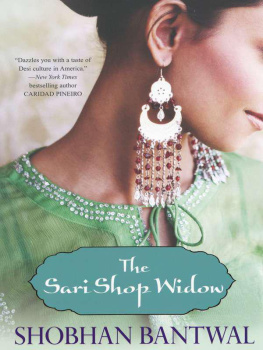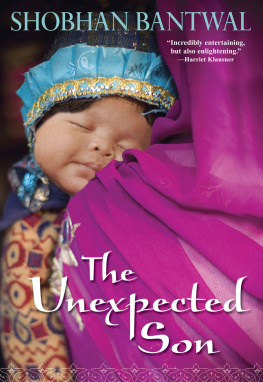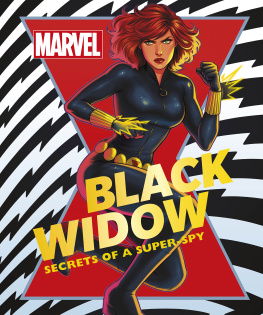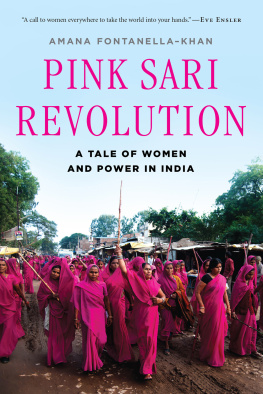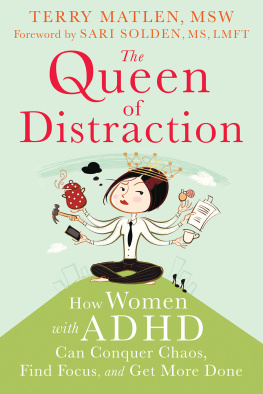Shobhan Bantwal - The Sari Shop Widow
Here you can read online Shobhan Bantwal - The Sari Shop Widow full text of the book (entire story) in english for free. Download pdf and epub, get meaning, cover and reviews about this ebook. year: 2009, publisher: Kensington Books, genre: Romance novel. Description of the work, (preface) as well as reviews are available. Best literature library LitArk.com created for fans of good reading and offers a wide selection of genres:
Romance novel
Science fiction
Adventure
Detective
Science
History
Home and family
Prose
Art
Politics
Computer
Non-fiction
Religion
Business
Children
Humor
Choose a favorite category and find really read worthwhile books. Enjoy immersion in the world of imagination, feel the emotions of the characters or learn something new for yourself, make an fascinating discovery.
- Book:The Sari Shop Widow
- Author:
- Publisher:Kensington Books
- Genre:
- Year:2009
- Rating:4 / 5
- Favourites:Add to favourites
- Your mark:
- 80
- 1
- 2
- 3
- 4
- 5
The Sari Shop Widow: summary, description and annotation
We offer to read an annotation, description, summary or preface (depends on what the author of the book "The Sari Shop Widow" wrote himself). If you haven't found the necessary information about the book — write in the comments, we will try to find it.
The Sari Shop Widow — read online for free the complete book (whole text) full work
Below is the text of the book, divided by pages. System saving the place of the last page read, allows you to conveniently read the book "The Sari Shop Widow" online for free, without having to search again every time where you left off. Put a bookmark, and you can go to the page where you finished reading at any time.
Font size:
Interval:
Bookmark:
THE FORBIDDEN DAUGHTER
THE DOWRY BRIDE
Published by Kensington Publishing Corporation

KENSINGTON BOOKS
http://www.kensingtonbooks.com
As always, at the beginning of a new venture, I offer a prayer of thanks to Lord Ganesh, the remover of obstacles.
My heartfelt appreciation goes to my generous, warm, and supportive editor, Audrey LaFehr, who has placed her faith in me time and again. The friendly and efficient editorial, production, public relations, and marketing folks at Kensington Publishing richly deserve my gratitude for a job well done. I look forward to working with you on my future projects.
To my agents, Stephanie Lehmann and Elaine Koster, thank you for your invaluable help and guidance at every step.
I am greatly indebted to my critique partners, Teri Bozowski and Carol Aloisi. They are gentle in their criticism but right on target.
The Writers Exchange at Barnes & Noble in Princeton, New Jersey, and the Writers Group at the Plainsboro Public Library deserve my thanks for their insightful comments and suggestions.
I offer a grateful hug to my many friends, who also serve as tireless cheerleaders, marketers, and promoters of my books.
To my family, whose love and support I could not survive without. They are my constant source of inspiration.
F or the second time in ten years her life was beginning to come apart. Anjali Kapadia stood still for a minute, trying to absorb the news. Could it possibly be a mistake? But it wasnt; shed heard it clearly. Despite her best efforts to curb it, the initial shock wave refused to ebb. The seemingly harmless bit of information was all it had taken to shatter the image of a satisfying lifestyle and career.
Her mind in overdrive, she started to pace the length of the tasteful and elegant boutique. Her boutiqueher babyher artistic and inventive skills put to optimum use in creating a fairytale store worthy of movie stars, models, and beauty queens.
Technically the business belonged to her and her parents as equal partners, but it was Anjalis creativity and vision that had turned it into a classy and successful enterpriseat least until recently. It stood apart like a maharani, a queen amongst the ordinary, plain vanilla sari and clothing shops of New Jerseys Little India.
The area known as Little India, located in Edison, was crammed with sari shops, jewelry stores, restaurants, grocery markets, and souvenir shops. It was a small slice of India buried in central New Jersey, a quaint neighborhood that smelled of pungent curry, fried onions, ripe mangoes, incense, and masala chai , strong tea laced with spices and oodles of thick, creamy milk.
Even the stores name was Anjalis brainstorm. Overrun with ho-hum and even dumpy names and ugly storefronts, Little India was badly in need of some class. So shed called her store Silk & Sapphires. It had a nice ring to it, and according to Hindu astrology, a sapphire supposedly dispelled the destructive influence of the fiery planet Shanee . Saturn. The stores window displayed the most elegant mannequins and rare jewelry to give it a boutique flavor rather than just a sari-cum-bauble shop.
The interior was done in soft cream and shimmering blue to fit the name. Teardrop crystal chandeliers hung from a vaulted ceiling. Strategically placed recessed lights highlighted the displays, mirrored walls created the illusion of space and light, and dense cream carpeting covered the sales floor and fitting rooms. No harsh music with screeching falsetto voices was allowed to tarnish the stores atmosphere either. Only soft instrumental pieces by both Indian and other masters were piped in through the sound system.
Shopping at Silk & Sapphires was meant to be a unique and indulgent experience.
The boutique also carried jewelryone-of-a-kind creations of precious and semiprecious gems fit for an empress or a blushing bride. It was all custom-made in India by her uncles, Anjalis moms brothers, two of whom were in the jewelry business in the state of Gujarat in northwestern India.
Nearly every piece of clothing the store sold was designed by Anjali, each outfit envisioned, then meticulously planned, cut, sewn, and embellished to her demanding specifications. She took pride in finding the right fabrics, trimmings, and tailors to make her designs evolve from an idea swirling in her brain to divine ensembles. Granted, her clothes and accessories were far more expensive than some, but they were worth the money. Every design was exclusive. Many of them were award winners in fashion shows and competitions.
She glanced at them and exhaled a long sigh. The colorful silks, the clingy chiffons, and the gossamer tissue-crepes were draped in an exquisite array on their pretty satin hangersrow upon row of lush, costly clothes. The pearls, the rainbow of beads, and the jewel-tone sequins lovingly sewn into the borders, sleeves, necklines, and bodices of the sleek garments sparkled and winked at her as she strode up and down the aisles, again and again.
What had gone wrong? How? When?
Could she be kissing her dress design business and her beloved store good-bye? If so, how soon? Catching her reflection in the mirrored wall behind the row of clothes, she realized her eyes were filled with resentment and frustration. Darn it! She rarely let bitterness prevail over her, and she wouldnt do so now. She was a woman who liked to laugh, although there hadnt been much to laugh about in the last decadenot since shed cremated Vikram.
How could her parents have concealed such a significant problem from her for so long? And how could they even dream up something so preposterous to address the problem? How could they jeopardize her career as well as theirs with one phone call?
She wouldnt stand for it. She couldnt. Shed get a loan from a bank to bail them out of their financial mess, or even beg and borrow from friends and acquaintances before shed give in to her parents harebrained plan.
Turning on the narrow heel of her tan sandals, she trudged back to the long glass display counter behind which her parents stood. Theyd been mutely watching her pace like a caged panther all this time. Now the mildly optimistic look on their faces told her they hoped her dark mood had passed, or at least diminished to some degree.
Well, no such luck. The distress was still spiraling inside her like a mad January blizzard. She raised her troubled eyes to them. Why didnt you guys tell me about the problem sooner?
Her father, Mohan Kapadia, a wiry man with glasses and a heavy mop of graying hair, gave a helpless shrug. We didnt want to upset you. And I honestly thought your mother and I could handle it by now.
But were equal partners in this. Im not a child who needs to be protected from bad news. She took a deep breath to steady her tremulous voice. I know I nearly lost my mind some years ago, but I dont need coddling anymore.
I know that, Anju, but Im upset at myself for not being a better businessman. He sent Anjali a rueful look. I suppose I didnt want to believe it myself at first. Its not easy admitting to ones daughter that one isuha failure.
She immediately regretted her outburst. Im sorry, Dad. Youre not a failure. Its not all your fault. Were all in this together.
But still
Im just as much to blame, she said. I should have kept an eye on our finances a bit more. What I cant believe is why you went to Jeevan of all people for help.
Font size:
Interval:
Bookmark:
Similar books «The Sari Shop Widow»
Look at similar books to The Sari Shop Widow. We have selected literature similar in name and meaning in the hope of providing readers with more options to find new, interesting, not yet read works.
Discussion, reviews of the book The Sari Shop Widow and just readers' own opinions. Leave your comments, write what you think about the work, its meaning or the main characters. Specify what exactly you liked and what you didn't like, and why you think so.

